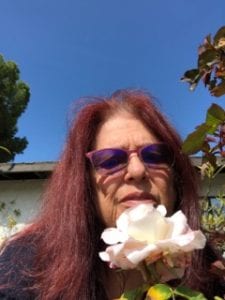Trina O’Quinn Explains What She Calls “Dyslexic Spin” And How She’s Coping With It
By Trina O’Quinn for the NABBW
 Recently, my husband and I were on our first vacation together in 3 years. COVID and my mother’s heart condition had kept us from traveling anywhere, especially together.
Recently, my husband and I were on our first vacation together in 3 years. COVID and my mother’s heart condition had kept us from traveling anywhere, especially together. So we started planning to go through Portland, Oregon to Sammamish, Washington, in the Seattle area, to stay with our son and his family, and visit with our daughter and hers.
Our eldest granddaughter was having a two year wedding anniversary party, which included a vow renewal and a weekend bash over the 4th of July weekend.
I was extremely excited. It was going to be a road trip. I had carefully moved myself toward being ready to travel over 60 miles away from home, which felt like a huge adventure after 3 years of restricted living. I had a packing list, was laying things on the guest bed, and checking them off the list to make sure everything I needed was packed. We went together to dinner and to bed early the night before our departure. Then, that Wednesday morning, June 15, 2022, we were “On the Road Again” — Highway 5 to Washington State.
We were in Bakersfield about 120 miles from home when we lost our radio reception. I asked my husband where he packed the CD’s. He said, “I didn’t. I thought you had.” They were not on my list, so I had overlooked them and assumed he had taken care of them.
Luckily, I have 65+ years of music in my brain from all my years of singing, and I just plugged into it. I’ve also learned to enjoy the quiet and clear my brain, so I practiced that too. For the next 800 miles that is what I did. We decided to stop in Grants Pass, Oregon for the night. After a little digging, we found a motel and went to dinner.
When we got back, I went into my two-part duffel bag to get out clean clothes and my night medicine. I had packed what I needed on the road in the top half. I found two of the three bottles of medicine I needed but could not find the third: my nighttime blood pressure medicine. I searched one more time and then it happened: my Dyslexic Spin.
What is a Dyslexic Spin, you ask? For me, it starts when I am looking for, or thinking about something, and I cannot find or recall it. I get caught in this loop that feels like the funnel of a tornado. I continue looking and going over the same area, my anxiety rises, and a panic attack begins to build. It builds and catches me with the debris on the edges of the swirling emotional tornado. It’s intense and overwhelming.
Then I work my way down until I touch ground and stop, with a thud. If anyone would see me in this experience, they would think I was bipolar and in a manic phase. (I believe that is why dyslexia is quite often misdiagnosed or missed all together.)
My husband just sat there in a chair and watched. When I asked him what was wrong, he said he “just wanted to run” when I got like this. That prompted me to sit down, take a breath, and stop. I decided to take everything out of the top of my duffel bag and repack it. (I had been digging through the top for the past 30 minutes.)
Guess what — I found it. It was wrapped up in an article of clothing. I decided from that point on I would pack all my needed medicine in the mesh pocket on the top inside of the duffel bag. Problem solved for now, but not for the future necessarily.
These Dyslexic Spins do reoccur periodically. I needed to write about the experience and figure out how not to go into a panic attack when I cannot find what I am looking for. When this happens in front of my husband, not only do I panic, but he gets frustrated because he cannot help.
This is how I centered myself and decided to cope with not having music for the next 1000 miles: to use my journal. In my next blog, I’ll explain how to organize a structured journal entry.



Leave a Reply
You must be logged in to post a comment.